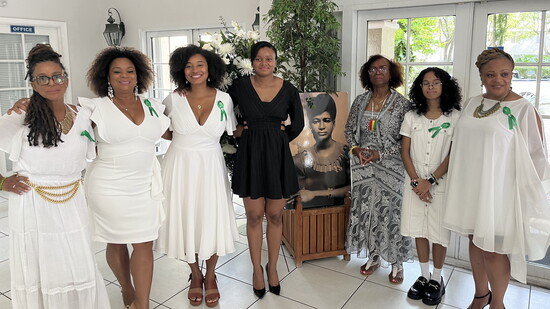“There are years that ask questions and years that answer.” — Zora Neale Hurston
JerriAnne Boggis is a storyteller. But do not imagine her sitting in a comfy chair by the fire, reading a hard-backed book to encircling children. Imagine her creating a fire all its own, re-igniting history, bringing light to its pages.
As the Executive Director of the Black Heritage Trail of New Hampshire, Boggis leads a robust team whose mission is to develop a community-based understanding of the critical role that Black people have played in the state for more than three centuries. In bringing Black history into visibility and celebration, the organization hopes to enrich our communities with a sense of shared history that inspires inclusivity and collective healing.
For Boggis, this mission also applies to the ancestral exploration she has done in her own life. In 2023, she was featured on “The Moth” stage, where she recounted the death of her aunt and the uplifting re-immersion of Jamaican culture she experienced as she and her family mourned during the Nine Night celebration. Boggis reflects on the power of reconnecting to collective history to create a sense of belonging and courage to move forward.
This experience, and her work with the Black Heritage Trail inspired Boggis to investigate the relationship between ancestry, culture, and place. It was a distorted relationship, she explains, because Black stories were transformed through the Atlantic slave trade. “On the seacoast,” she says, “there are so many stories that have been erased or forgotten. People before us are just separated by time, not by space. They used to walk where we walk now.”
Tradition, she has found, can offer a healing revival. Boggis recently found herself again immersed in a Nine Night experience, this time for her mother. Originally, she explains, Jamaicans brought this celebration from the west coast of Africa. When a loved one passed on, the person’s body lay resting for nine nights in the home while loved ones visited. On the ninth night, they erupted in celebration and sent the deceased away to the next world.
On this night, family surrounded Boggis as they ate, drank, and danced. Together, they created a memorial table with pictures and sweets (Boggis’s mother was diabetic) and called upon the ancestors to join them. They wove together their shared stories, their Catholic traditions, the Mormonism her mother followed, and the sounds and rhythms of Africa and the Caribbean. “It was a frenzied celebration,” she recalls. At midnight, they all carried her mother’s last glass of bedside water through the house, and then released it into the midnight air. The experience was profound. “We realized there was something more than what we were doing,” she reflects. “A palatable moment when it was clear that there was something primordial that connected us to the past.”
When asked how she bridges this deeply personal experience with her work here in New Hampshire, Boggis’s reflective inquiry is palpable, as if she is asking the question while answering it. “Culture is never static,” she says. “If we try to control it, it becomes rigid and we don’t grow. In Jamaica, it took on its own flavor. European, African, Caribbean. Same in Brazil. In America, yet another flavor. In family, we add another aspect.” She explains that even amidst cultural evolution, humans can still find “rootedness,” a way of becoming grounded in their ancestry.
While rooted, says Boggis, we can celebrate differences. “That’s why you can hear a drum beat and it affects you, but you have never been to Ghana.” She ponders the Spanish and African influences on Brazil, and the roots of blues, jazz, and reggae here in America. With Africa as the start of humanity, she says, we each have a different sense of “motherness.” However, as cultures grow out of our rootedness, our differences “still make up the whole.”
Here on the seacoast, Boggis invites all ages and backgrounds to look to previously lost or hidden stories of Black history as a way to acknowledge, appreciate, and realize “how these stories break stereotypes and connect our now to that history.” To honor Juneteenth, the Black Heritage Trail will hold a special series that will explore the historical practices around enslavement. Throughout the month of June, visitors can take tours, attend discussions, and enjoy music and dance performances.
“Portsmouth is an amazing town for visitors to experience,” says Boggis. “Old New England flavor, stories of the founding fathers, the beauty of a seaport town. But there are other stories – like those of the Black Heritage Trail – that intertwine and grow into the American story. This is an intermingling of many cultures, many histories. To be fully in space in time here, we have to experience those.”
"On the seacoast, there are so many stories that have been erased or forgotten. People before us are just separated by time, not by space. They used to walk where we walk now.”
